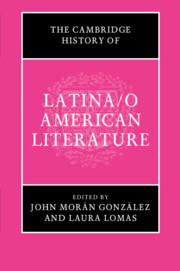Book contents
- The Cambridge History of Latina/o American Literature
- The Cambridge History of Latina/o American Literature
- Copyright page
- Dedication
- Contents
- Contributors
- Acknowledgements
- Chronology
- Introduction
- Part I Rereading the Colonial Archive
- Part II The Roots and Routes of Latina/o Literature
- Part III Negotiating Literary Modernity
- 14 Oratory, Memoir, and Theater
- 15 Literary Revolutions in the Borderlands
- 16 Making It Nuevo
- 17 The Archive and Afro-Latina/o Field-Formation
- 18 Floricanto en Aztlán
- 19 “The Geography of Their Complexion”
- 20 Cuban American Counterpoint
- 21 Latina/o Theatre and Performance in the Context of Social Movements
- Part IV Literary Migrations across the Americas, 1980–2017
- Epilogue
- Bibliography
- Index
- References
18 - Floricanto en Aztlán
Chicano Cultural Nationalism and Its Epic Discontents
from Part III - Negotiating Literary Modernity
Published online by Cambridge University Press: 16 February 2018
- The Cambridge History of Latina/o American Literature
- The Cambridge History of Latina/o American Literature
- Copyright page
- Dedication
- Contents
- Contributors
- Acknowledgements
- Chronology
- Introduction
- Part I Rereading the Colonial Archive
- Part II The Roots and Routes of Latina/o Literature
- Part III Negotiating Literary Modernity
- 14 Oratory, Memoir, and Theater
- 15 Literary Revolutions in the Borderlands
- 16 Making It Nuevo
- 17 The Archive and Afro-Latina/o Field-Formation
- 18 Floricanto en Aztlán
- 19 “The Geography of Their Complexion”
- 20 Cuban American Counterpoint
- 21 Latina/o Theatre and Performance in the Context of Social Movements
- Part IV Literary Migrations across the Americas, 1980–2017
- Epilogue
- Bibliography
- Index
- References
Summary
- Type
- Chapter
- Information
- The Cambridge History of Latina/o American Literature , pp. 394 - 410Publisher: Cambridge University PressPrint publication year: 2018



